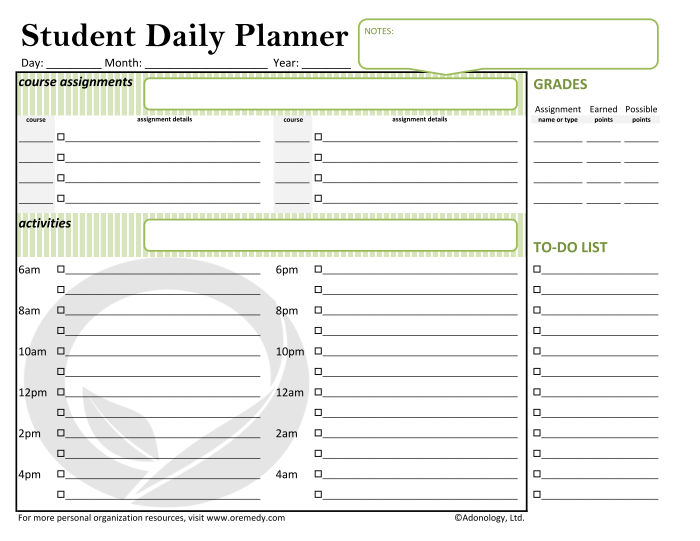As a fourth year student who
managed to come out of the last three years with a decent study and work result,
I still find myself struggling with unlimited work to do, whether it is
part-time jobs, academic study, social involvement, graduate job/internship
application, and personal tasks, yet in such limited 24 hours per day. Everyone
is in the same boat of the given timeframe and there’s no magic wand to create
extra time for you just to have a little 10-minute lie-in which often turns out
to be an hour or so. Time is a ruthless creature, isn’t it? Once it turns its
back to you, you won’t see it again. However, rest assured, keep reading and
you will find ways to use your time more effectively and remain a good
work/life balance.
 |
| Source: http://www.simplemindfulness.com/wp-content/uploads/2011/11/Time-management1.jpg |
Have a big picture
In the beginning of the academic year,
get a yearly planner often distributed free of charge as a promotional material
at freshers’ fair. Fill out fixed important events to gauge the gap between
them and plan ahead, which may include:
- Coursework deadlines
- Exams
- Holidays
- Birthdays
- Socials
Keep adding more once you know
them. This helps you grasp the big picture, spread out the preparation work,
and avoid peak times when several significant events happen simultaneously.
Below are some free templates you can use:
·
Link
1: Word format
·
Link 2:
Word format
·
Link
3: Excel format
 |
| Source: http://www.st-theresas.leeds.sch.uk/calendars/present/year.jpg |
Keep a weekly routine
Referring to the syllabus of
academic modules, you may find recommended self-study hours per week. Try to
stick to them in order to secure a good grade. It is up to you to spread this
out a few hours per day or cram most hours into your lecture-free days. Reading
University provides a simple calculation of weekly hours for a typical student here:
In one week there are 7 x 24
hours
|
= 168 hours
|
Subtract 8 hours a day for
sleeping
|
= 112 hours
|
Subtract another 3 hours a day
for eating, bathing, etc.
|
= 91 hours
|
Subtract 35 hours a week for
study commitments
|
= 56 hours
|
Dividing by 7, you end up with 8
hours a day for sports, socials, household chores, paid work, family
commitments, etc. Individual timetables may vary but you get the idea to
personalise your own.
Regarding organising weekly
tasks, a foolproof technique that works wonder for me is colour coding tasks in
a daily planner; for instance, black for academia, blue for work, and red for
extracurricular activities. I also use the same colour codes for weekly to-do
list. This helps you evaluate if you spend an equal amount of time for each aspect
of university life, maintain work-life balance, and prioritise what is more
essential, not to mention the little self-satisfaction once tasks are ticked
off.
 |
| Source: http://www.oremedy.com/images/student-daily-planner-gm.gif |
Unfriend the thief of time – procrastination
Let’s face it – everyone, to some
degree or another, has at least once been over-optimistic about their ability
to complete a task on a tight deadline and hence gets distracted by their
constant texts, new emails, interesting websites, tempting social invitation,
and what not. I am not going to tell you what you should do to deal with
procrastination but what I am sharing with you is three strategies that have
positive effects on my self-discipline and focus. So you can analyse and judge
if they will work well for you as well.
 |
| Source: http://purduecco.files.wordpress.com/2012/02/the-dangers-of-procrastination.jpg |
Find my favourite places to study
I learn best in a quiet and
bright environment where everyone else is also studying. Thus, finding and
familiarising with a few comfortable spots in the library turns my thinking
mode on. If friends kept interrupting and stay unfocused on their study, I’d
set an agreed time for a short fresh air or coffee break.
Concentrate on finding answers for specific questions whilst reading
Before reading, I jot down
specific questions to get out from the material, keep checking and adding notes
to their answers. That way, I save time reading 20 pages, for example when the
answers only lie in a paragraph.
Give myself incentives
Who doesn’t like rewards, even if
it’s self-incentivised? During the course of researching for coursework, I
often stumble upon interesting things that may not be very relevant to the
coursework itself. Instead of getting sidetracked, I bookmarked them as something
to look forward to after finishing what has been set out to be done in that
session.
All in all, I’m sure you all want
to become a well-rounded person by getting involved with every aspect of
university life. And yes, it would be in an ideal world if we had unlimited
time. However, hopefully these non-exhaustive tips above help you manage your
time better. What else has worked for you?
Read this on AFS Blog
Read this on AFS Blog





